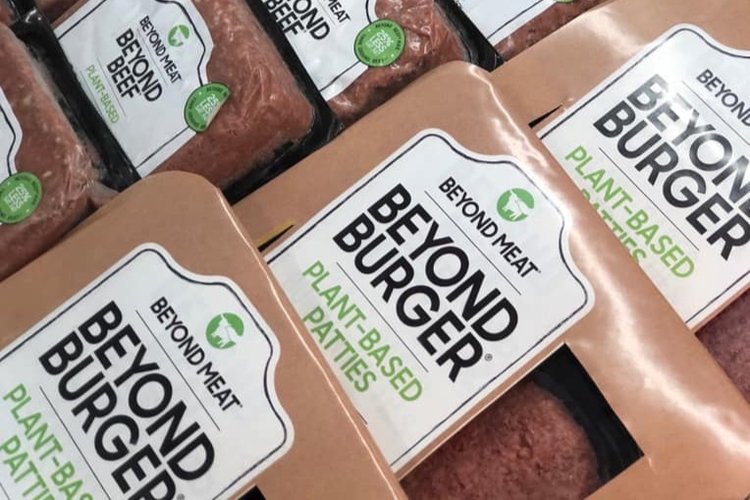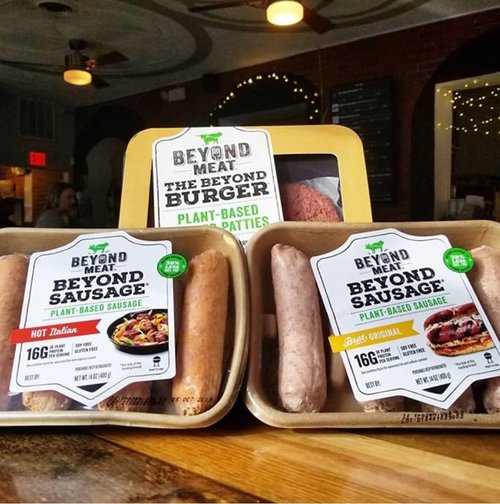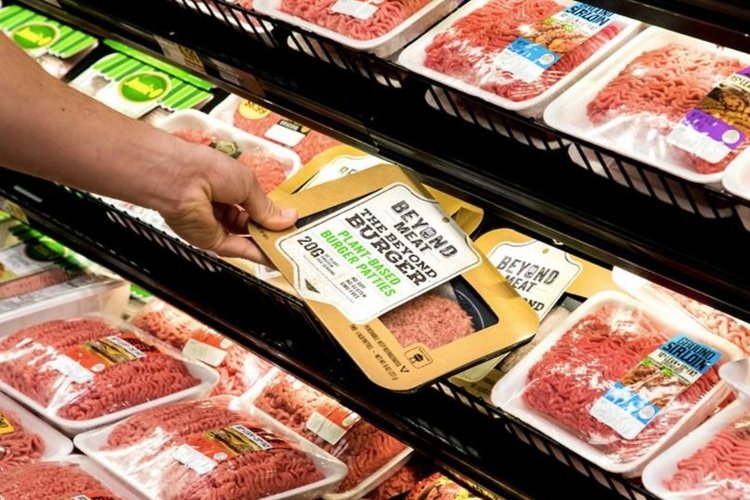Plant Based Burgers Signal Shift in Canadian Grocery Retail

It was just a matter of time before we saw Beyond Meat, the California-based company partially owned by Bill Gates and meat-giant Tyson Foods, make a jump from drive-throughs to grocery store shelves
By Sylvain Charlebois
Beyond Meat recently announced that its vegan burger will be available at several large Canadian grocers beginning in May, just in time for BBQ season.
It will be interesting to see how grocers will market these products in stores. They could be right next to the bloodied protein version most of us are accustomed to, or somewhere close to the meat counter. It will also be interesting to see how Beyond Meat’s price point compares to regular animal protein products. This could bring some dearly needed top-line growth for desperate grocers who have seen meat counter sales become less than reliable of late.
“Consumers who look to reduce their meat consumption are often concerned with protein content and getting enough of it”
In a matter of days, Canadians will be able to purchase the plant-based burgers almost everywhere: at Co-op Food Stores, IGA, Loblaws, Fresh Street Market, Longos, Metro, Save On Foods, Sobeys, and Whole Foods Market. Beyond Meat’s capacity to deliver, execute, and supply all these outlets at once is nothing less than impressive. Rarely in Canada have we seen a supplier orchestrate such a well-coordinated, timely invasion of a market through careful management and marketing.
Such an oligopolistic endorsement of the product, something we rarely see in this country, is making the senior leadership team at A&W look like geniuses. A&W was the one Canadian company to introduce the product to Canadians a few years ago. Now grocers are drinking the proverbial plant-based Kool-Aid, all at once.A&W’s campaign was indeed a success, but it did bring its share of controversy. At the time, A&W, a Vancouver-based restaurant chain, was criticized as anti-Canadian and anti-meat. Ranchers love to detest A&W these days. Canadians remain quite attached to meat consumption, but an increasing number are reconsidering their health priorities. Other drivers are animal welfare and environmental stewardship, but health appears to be the one determinant influencing a large base of the marketplace.
But meat pundits do have a point. Nutritionally, the case for Beyond Meat may be very strong, but it still cannot label itself as a true replacement to the real thing on a BBQ since the Beyond Meat burger is mostly made of peas and soy. Physiological properties, the texture of the product itself, and the way it reacts to the BBQ environment do not replicate true meat, at least not yet. But this may change.
The company aims to become listed on the Dow Jones, through an IPO worth over $1.2 billion U.S. It is an impressive number, considering how marginalized plant-based dieting was just a few years ago. Beyond Meat, the 10-year old company whose products are now available in more than 27,000 food service outlets worldwide, has taken the world by storm with a decent product which is likely to become a quasi-replica of what most omnivores have enjoyed for years, without the cholesterol and guilt.
The company will have the infrastructure, the cash, and the knowledge to channel a different source of protein into the world. This industry leader will also be more transparent than others as it becomes a publicly-traded company. This is a good strategy, given how much the meat industry has been criticized over the years for not being transparent enough. Beyond Meat needs only one recall, once incident, to kill its momentum – no pun intended. A more open enterprise, though, will bring less suspicion, which is desirable, especially for a company like Beyond Meat.
It does make us wonder, though, why Beyond Meat is not Canadian. It’s an American product, fostered and propelled by American entrepreneurial spirits – very bright spirits, albeit, but American nonetheless. Our way of thinking regarding food innovation suppresses any chance for a company to come up with a project like this. There are glimmers of hope, however, as startups are erupting all over the place and will bring a proper dosage of innovation, in due course.
What will help these companies is how the plant-based market will evolve and mature. Not all vegetable proteins are created equal. Consumers who look to reduce their meat consumption are often concerned with protein content and getting enough of it. Canadian startups – even perhaps Maple Leaf Foods, which just announced a new meatless plant built in Indiana – can capitalize on the hyper-segmentation of the plant-based narrative over time.For a while, Beyond Meat will own this space, along with other firms like Impossible Foods. Beyond Meat does have its flaws, such as having soy protein isolates, a fact that has raised some health concerns, according to a study recently conducted by Harvard. Opportunities will present themselves for Canadian companies to consider, but they need to be ready.
*Editor’s Note: Tyson Foods has since sold their stake in Beyond Meat
Originally published for Retail Insider
Sylvain Charlebois is Director, Agri-Food Analytics Lab, and a Professor in Food Distribution and Policy at Dalhousie University

















